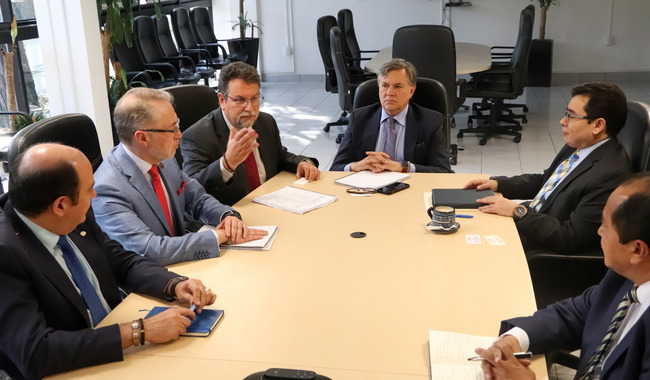The National Agri-Food Health, Safety and Quality Service (Senasica) emphasized that the technical collaboration of more than 30 years with the Inter-American Institute for Cooperation on Agriculture (IICA,by its Spanish acronym) has contributed to position Mexico as a world reference in sanitary issues.
In a meeting with the Director General of IICA, Manuel Otero, and its representative in Mexico, Diego Montenegro Ernst, the Chief Director of Senasica, Javier Calderón Elizalde, emphasized that this alliance has been strategic in protecting the national agricultural sector and the American continent, as well as strengthening the production and safe exchange of healthy and safe food.
Currently, Mexico has a privileged international sanitary status, and in two decades we have gone from being a country with a deficit to a safe food exporting power, he said.
He said that in order to be competitive in food trade, countries must move towards a constant improvement of production processes to guarantee food supply at affordable prices and help their producers, especially small-scale producers, to enter into more and better markets.
He said that the Mediterranean fruit fly (Medfly) program operated by the Ministry of Agriculture and Rural Development's agency on the southern border is an example of the efficiency achieved by Senasica and IICA, particularly in the implementation of actions against pests that could damage agriculture in Mexico and the continent.
Mexico's health concerns are not isolated; pests and diseases know no borders, which is why, by protecting Mexico's agrifood production, we are safeguarding that of the entire region," he said.
Calderón Elizalde explained that with IICA's support, Mexican technicians share their knowledge with counterparts in other countries to strengthen their defense barriers against latent risks, such as African swine fever (ASF), which has been present in the Dominican Republic and Haiti for more than a year, and Fusarium oxysporum sp. cubense Raza 4 Tropical (Foc R4T), a disease that affects bananas and whose presence has been reported in Colombia and Peru.
He said that Senasica's efforts to standardize techniques for the prevention, control and eradication of pests and diseases would not be successful without the leadership of IICA, which brings together the agendas of 34 countries on the continent, from Canada to Patagonia.
We are in constant communication with all our sister countries in the Americas. The problems are huge, so the organizations are involved on a day-to-day basis and IICA has the experience to join forces, he added.
The Director General of IICA, Manuel Otero, said that for three decades of uninterrupted relations with Mexico, the Institute has been a means for the Mexican government's sanitary agency to provide the best possible service to the productive sector and consumers.
Mexico's sanitary status is enviable for the vast majority of countries on the continent. The challenge is to maintain and replicate it in the region, he said.
IICA's representative in Mexico, Diego Montenegro Ernst, said that during 2023 cooperation with Senasica will focus on technical collaboration programs with sanitary agencies, such as that of California, United States, which is interested in learning about Mexico's experience with the Moscamed program.
He also said that they will implement digital extension programs to facilitate access to knowledge, information and agricultural technologies for producers, groups and rural organizations.
He added that there are requests from several countries to visit Senasica's Center for Health Emergency Operations (COES,by its Spanish acronym), an infrastructure through which specialized personnel monitor exotic pests and diseases around the world, provide information to technical areas and support the work carried out by phytosanitary inspection officers at ports, airports and borders to prevent their entry into Mexico.
The meeting was also attended by the Administrator and Technical Coordinator of the IICA Representation in Mexico, Martín Barajas and José Luis Ayala, respectively, and the Technical Secretary of the Institute's Governing Bodies, Héctor Iturbe.
